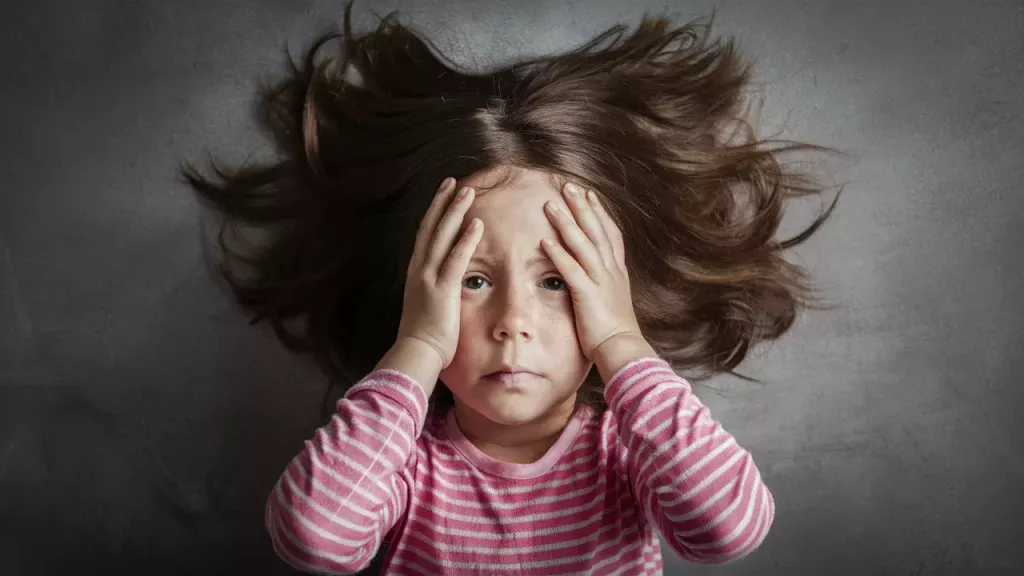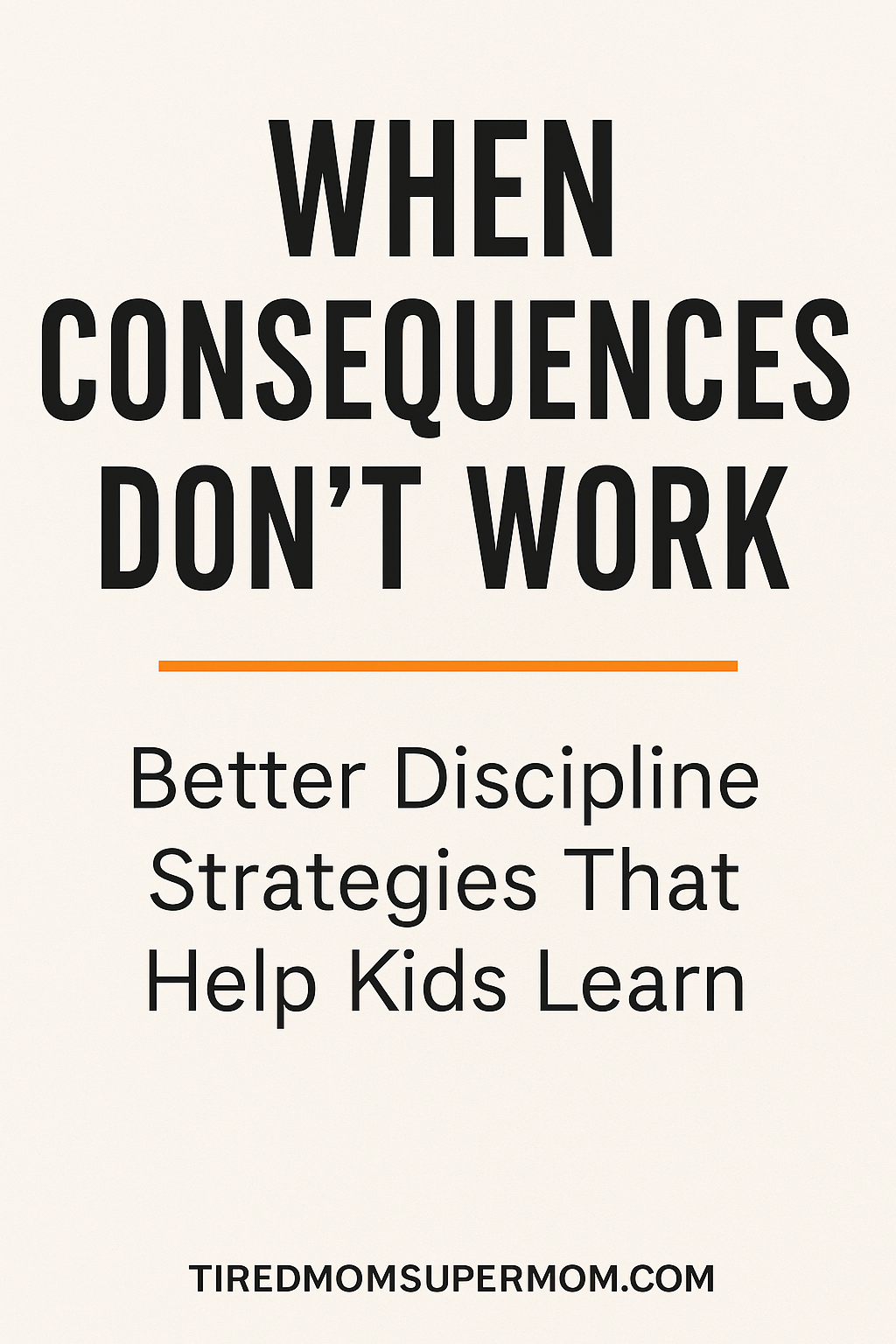7 Powerful Strategies When Consequences Don’t Work
Consequences are a classic go-to for parenting. “If you don’t clean your room, you can’t have screen time.” “If you hit your brother, you lose your toys for the day.” Sound familiar?
But what happens when consequences don’t work — and no matter what you try, your child’s behavior doesn’t improve?
You’re not failing. You’re not alone.
It just means it’s time to rethink how we discipline and teach.
Let’s dig into why consequences sometimes fail and, more importantly, what to do instead so you can build a relationship based on respect, responsibility, and real learning.
Heads up: This post may include affiliate links. As an Amazon Associate, I earn from qualifying purchases—at no extra cost to you. Full privacy policy and disclosure here.

Why Traditional Consequences Don’t Always Work
Consequences are supposed to teach kids responsibility and self-control. But in real life, it’s often not that simple.
Here are a few reasons why consequences don’t work for many children:
1. The Child Doesn’t Feel Connected
Kids are wired for connection. When they feel misunderstood, punished, or isolated, they often push back instead of learning. Without emotional connection, consequences can feel like rejection.
2. The Consequence Feels Random or Unfair
If the consequence isn’t clearly tied to the behavior, kids view it as punishment — not a learning opportunity. Random restrictions just create frustration and rebellion.
3. The Child Lacks the Skills to Behave Differently
Sometimes, a child wants to behave but doesn’t have the emotional regulation skills, language skills, or problem-solving abilities yet.
In these cases, consequences just add shame instead of building skills.
4. Too Much Focus on Immediate Obedience
If the goal is to “make the behavior stop NOW,” the deeper lesson gets lost. True discipline is about teaching, not just controlling.
Related Reading:
➔ Understanding Why Your Child Doesn’t Care About Consequences
If you’re ready for step-by-step help applying positive discipline strategies at home, I highly recommend Positive Parenting Solutions — it’s a fantastic online course packed with real tools for parents who want lasting change
What to Do When Consequences Don’t Work
If consequences don’t work, don’t give up — pivot!
Here are proven parenting strategies to replace ineffective consequences with better tools for real change:
1. Focus on Connection First
Before correcting behavior, focus on connection.
A child who feels heard, loved, and valued is more likely to listen and cooperate.
Try This:
- Get down on their level
- Make eye contact
- Reflect feelings (“You’re really frustrated right now.”)
(If you want to practice daily connection, a great resource is this Parent-Child Journal — it builds emotional bonds naturally!)
2. Teach Skills Instead of Punishing
If your child struggles with emotional regulation, problem-solving, or patience, simply punishing bad behavior doesn’t help.
Teach the missing skills instead!
Examples:
- Practice deep breathing together
- Role-play handling disappointment
- Coach through problem-solving steps
Helpful Tool:
- Calm-Down Cards for Kids — a visual tool for younger children.
3. Use Natural and Logical Consequences (Correctly)
Natural consequences happen without your interference — like getting cold if you refuse to wear a jacket.
Logical consequences are parent-arranged but connected to the behavior — like losing a toy that was thrown.
IMPORTANT: Consequences must be:
- Related to the behavior
- Respectful (not shaming)
- Reasonable (not harsh)
Related Reading:
➔ The Power of Natural Consequences for Kids
If you’re new to this approach, this Positive Discipline Book is a great start.
4. Set Clear Limits — and Stick to Them
Consequences often fail when kids don’t even know what the boundaries are.
Clear, simple, consistent limits work better than endless threats.
Tip:
- Use short, clear rules (“Hands are for helping, not hurting.”)
- Remind without lectures
- Follow through calmly
Related Reading:
➔ 29 Important Differences Between Limits and Consequences for Kids
5. Adjust Your Expectations (Especially for Strong-Willed Kids)
Some kids (especially strong-willed ones) view punishments as challenges to fight, not lessons to learn.
If you’re dealing with a spirited child, remember:
- Respect their need for autonomy
- Offer choices when possible
- Avoid power struggles
Related Reading:
➔ How to Handle a Strong-Willed Toddler Without Losing Your Cool
You might love this Strong-Willed Child Parenting Guide too!
Alternatives to Traditional Consequences
| Alternative Discipline Strategy | How It Helps |
|---|---|
| Problem-Solving Together | Builds communication and cooperation |
| Role-Playing Right Behavior | Helps kids practice skills in a safe way |
| Positive Reinforcement | Encourages growth through praise |
| Emotional Coaching | Teaches kids to name and manage big feelings |
| Natural Consequences | Lets real life teach without power struggles |

Common Questions About Consequences That Don’t Work
How can I teach discipline without using punishments?
Use respectful, related natural or logical consequences, focus on connection, and teach missing skills like calming down, problem-solving, or asking for help.
Why don’t traditional consequences work for my child?
Traditional consequences often aim at controlling behavior instead of teaching skills. If your child lacks emotional regulation or feels disconnected, punishments fall flat.
When should I step in instead of letting a consequence play out?
If the natural consequence would lead to serious harm (physical or emotional), it’s best to step in and set a logical boundary instead.
How long does it take to see results when changing discipline methods?
Consistency is key! Some children adjust quickly, but for others, especially if trust has been strained, it might take a few weeks or even months.
What if my child doesn’t seem to care about any consequence?
This is often a connection issue, not a discipline issue. Focus first on rebuilding emotional bonds before expecting behavior change.

Final Thoughts: You’re Building Long-Term Character, Not Just Immediate Obedience
If consequences don’t work for your child, it’s not a parenting failure.
It’s a chance to teach differently — with patience, respect, and deep connection.
Parenting isn’t about controlling kids. It’s about guiding them toward self-control, empathy, and responsibility.
You’ve got this! 💛
➡️ Love these parenting tips?
👉 Pin this post for later and share it with a fellow parent who needs encouragement today!

👉 Leave a comment below — What discipline strategies have helped your family?
